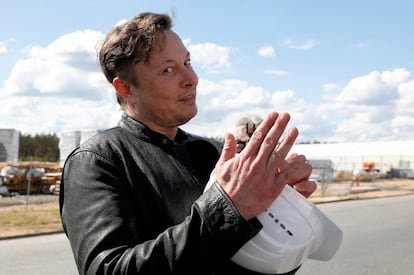What will Elon Musk do with Twitter?
The wealthiest person in the world has just bought one of the planet’s most influential social media platforms. What for?

Twitter’s board of directors has finally decided to sell the company to Elon Musk, the world’s richest man and head of electric vehicle maker Tesla as well as aerospace firm SpaceX. On the digital conversation platform itself, the new owner’s personality has triggered a huge debate and started several global trends. There are those who believe that Musk will help the company achieve new goals, and those who feel that the only alternative is to flee Twitter forever; very few seem to have nothing to say about it.
I’m leaving Twitter I’m moving to
— Ramp Capital (@RampCapitalLLC) April 25, 2022
if Elon Musk Canada if
buys it. Trump wins.
🤝 pic.twitter.com/XfNmC8oBDj
Musk’s own statements about Twitter imply that he is buying it to improve it, not for money or influence. He offered an analysis of his views at a TED talk on April 14, the same day that his offer became public. His theory was that Twitter needs more clarity in its rules, more transparency in its algorithms and more freedom of speech. “I also want to make Twitter better than ever by enhancing the product with new features, making the algorithms open source to increase trust, defeating the spam bots, and authenticating all humans,” he said. Details were, however, scant.
His overarching goal, according to his own words, is to save democracy. At the TED talk he said that Twitter has become a “de facto digital town square” and that “it’s really important that people have both the reality and the perception that they are able to speak freely within the bounds of the law.”
This resource is essential for the functioning of democracy in the US and in many other countries, he added.
Musk also thinks that the Twitter algorithm should be posted on GitHub, the open source platform used by computer programmers, and that it should be open to comments and suggestions, “just like Linux and Signal.” Users must also be perfectly aware of why decisions are made: any action on why a tweet is promoted or not should be evident, so that there is no behind-the-scenes manipulation, whether algorithmically or manually.
I hope that even my worst critics remain on Twitter, because that is what free speech means
— Elon Musk (@elonmusk) April 25, 2022
On freedom of expression, he admitted to being “a free-speech absolutist” and defined freedom of expression as a situation where someone you don’t like can say something you don’t like. “If that is so, we have freedom of expression,” he said.
After he uttered that statement, journalists were quick to bring up numerous examples of times when Musk tried to silence or limit the speech of someone he does not like, such as when he called a caver who helped rescue children trapped in a Thai cave a “pedo guy,” or when he spied on a former employee for speaking to the press or when he blocked the account of a Florida youth who was posting all of Musk’s flights on Twitter.
No clue if Musk will make Twitter worse, but anyone who believes Musk cares about protecting speech please hmu I have some exciting bridges I'd like to sell you! pic.twitter.com/p7XfnOhOYE
— Lincoln Michel (@TheLincoln) April 25, 2022
This is where the real debate begins about what it means for the richest person in the world to be able to do what he wants with one of the world’s main communication platforms. This purchase is not Jeff Bezos acquiring The Washington Post or Rupert Murdoch acquiring The Wall Street Journal. When asked why he thought the richest person would buy Twitter, his response was to laugh at Mark Zuckerberg, noting that because of Meta’s share ownership structure, “Mark Zuckerberg the 14th will still be controlling these companies.” That won’t happen with Twitter, he said.
Musk also said that he was not buying Twitter for profit. “It’s not a way to make money. My intuitive feeling is that having a platform that is maximally trusted and broadly inclusive is extremely important to the future of civilization,” he said. But it’s one thing not to care about money and another not to perceive ways to exploit the benefits of Twitter. The tool has already given him a lot: his tweets about Tesla, SpaceX and even the dogecoin cryptocurrency have made him richer.
Permanent access to such a platform, and maintaining influence, are essential, and few people understand the importance of attention today like Musk. Twitter has 10 times fewer users than Facebook, YouTube or Instagram, but its weight is not proportionally lower.
At the TED talk, Musk discussed the concept of permanent bans on Twitter, saying it is better “to be reluctant to remove things and be cautious about permanent bans. I think temporary suspensions are better than permanent bans.” The most famous suspension from Twitter is Donald Trump. A hypothetical return to Twitter in 2022 would help the former president prepare a new run for the White House in 2024. The Republican Party is favorably viewing Musk’s acquisition of Twitter.
Musk may want to return his account to Trump as a sign of freedom of expression, but it would also be clear that he would be doing him a favor that the hypothetical future president of the United States could return once in the White House, either by favoring his companies or helping with Musk’s problems with the the Securities and Exchange Commission, the market watchdog. Other governments could also aspire to use Twitter more freely or without labels such as “state-owned media.” If it’s something that could harm Tesla’s interests, as in China, the conflict of interest would be obvious. Suspicions about Twitter’s decisions will be pinned on Musk, for better and for worse. But he has probably already thought it out.
In his talk, Musk said that he will not edit tweets personally, but it is difficult to believe that the most relevant decisions will not pass through his hands.
Within Twitter, a company accustomed to public disturbances, the atmosphere was even more tense than on other occasions. Aside from all the public debate about Musk, the entrepreneur is famous for pushing his companies toward excellence through an iron-fisted business organization. The story about how he slept at the Tesla plant during the most difficult days of the company is the stuff of legend. At Twitter headquarters in San Francisco, the shock may be especially noticeable.
Tu suscripción se está usando en otro dispositivo
¿Quieres añadir otro usuario a tu suscripción?
Si continúas leyendo en este dispositivo, no se podrá leer en el otro.
FlechaTu suscripción se está usando en otro dispositivo y solo puedes acceder a EL PAÍS desde un dispositivo a la vez.
Si quieres compartir tu cuenta, cambia tu suscripción a la modalidad Premium, así podrás añadir otro usuario. Cada uno accederá con su propia cuenta de email, lo que os permitirá personalizar vuestra experiencia en EL PAÍS.
¿Tienes una suscripción de empresa? Accede aquí para contratar más cuentas.
En el caso de no saber quién está usando tu cuenta, te recomendamos cambiar tu contraseña aquí.
Si decides continuar compartiendo tu cuenta, este mensaje se mostrará en tu dispositivo y en el de la otra persona que está usando tu cuenta de forma indefinida, afectando a tu experiencia de lectura. Puedes consultar aquí los términos y condiciones de la suscripción digital.









































